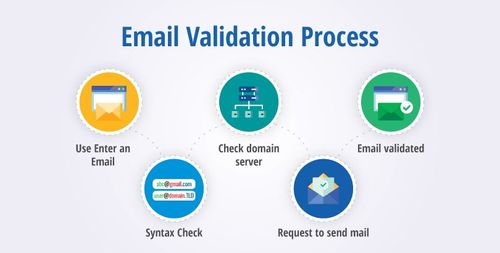The Significance of Email Validation Standards
Email validation standards are the foundation of reliable and efficient digital communication. They play a pivotal role in ensuring that email addresses are correctly formatted, reducing bounce rates, and enhancing the overall quality of email communication. Here's why email validation standards matter:
Data Accuracy: Accurate email addresses are essential for successful communication. Validating email addresses ensures that you reach your intended recipients.
Spam Prevention: Valid email addresses help prevent spam and ensure that your messages are delivered to genuine recipients.
User Experience: A well-validated email address enhances the user experience by reducing the likelihood of typos and errors during sign-up or contact forms.
Regulatory Compliance: Compliance with data protection laws, such as GDPR, often requires accurate and validated email addresses.
Email Address Syntax Rules
The foundation of email validation standards lies in the syntax of an email address. The following are key rules for email address syntax:
1. Local Part
The local part of an email address is the portion before the "@" symbol. It must adhere to the following rules:
- Consist of alphanumeric characters, hyphens, periods, and underscores.
- Cannot begin or end with a period.
- Periods cannot appear consecutively.
- May be case-sensitive, although most email systems treat addresses as case-insensitive.
2. "@" Symbol
The "@" symbol is mandatory and separates the local part from the domain part of an email address.
3. Domain Part
The domain part of an email address specifies the email server's domain and follows these rules:
- Consists of domain labels separated by periods.
- Each label can contain alphanumeric characters and hyphens but cannot begin or end with a hyphen.
- The last label (TLD or top-level domain) must be at least two characters long.
4. Length Limits
Email addresses should not exceed 320 characters in length, including both the local and domain parts.
5. Internationalization
Internationalized email addresses (IDNs) allow non-ASCII characters, enabling email addresses in non-Latin scripts. IDNs follow specific encoding rules.
Best Practices for Email Validation
To ensure the highest level of email validation accuracy, consider these best practices:
Use Established Libraries: Leverage well-known libraries and tools for email validation, such as regular expressions or dedicated email validation libraries in programming languages.
Real-Time Validation: Implement real-time validation during user input to provide immediate feedback and prevent invalid email addresses from being entered.
DNS Validation: Check the DNS records of the domain part to verify its existence and ensure it can receive emails.
Disposable Email Detection: Employ techniques to detect and reject disposable or temporary email addresses commonly used for spam.
Update Validation Regularly: Stay up-to-date with email validation standards and update your validation logic as needed.
Frequently Asked Questions
Let's address some common questions related to email validation standards:
Q1: Can an email address contain special characters like $, %, or #?
No, email addresses should only contain alphanumeric characters, hyphens, periods, and underscores.
Q2: Are email addresses case-sensitive?
Email addresses are generally treated as case-insensitive, meaning "[email protected]" and "[email protected]" are considered the same.
Q3: What is the maximum length for an email address?
An email address, including both the local and domain parts, should not exceed 320 characters.
Q4: How can I validate internationalized email addresses (IDNs)?
To validate IDNs, you can use libraries or tools that support the Punycode encoding method for non-ASCII characters.
Q5: Are there email validation standards for specific industries or regions?
While there are general email validation standards, specific industries or regions may have additional requirements or guidelines. It's essential to research and comply with any relevant regulations.
In conclusion, email validation standards are the bedrock of reliable and accurate digital communication. By understanding these standards, adhering to best practices, and staying informed about the evolving landscape of email validation, you can ensure that your communication efforts are effective, efficient, and trustworthy. Embrace email validation standards as a means to elevate the quality of your digital interactions and enhance your online presence.



